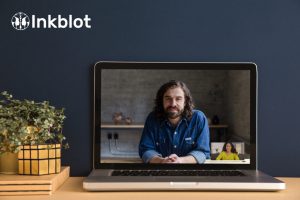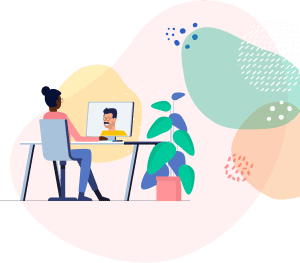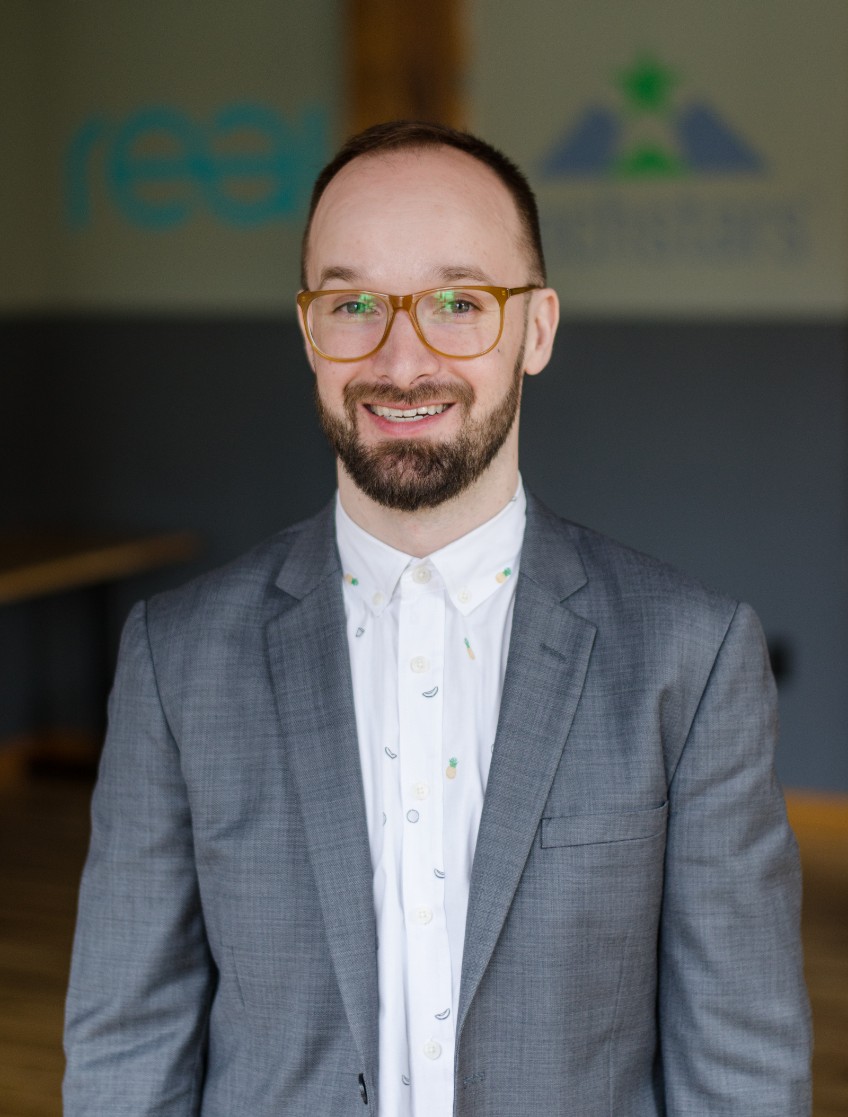[vc_row][vc_column][vc_separator color=”black”][vc_row_inner][vc_column_inner][vc_column_text]How inclusive is Canada’s free healthcare system? For years health care professionals and Canadians who are lacking access to adequate resources, due to a lack of finances and other variables, have been questioning visible cracks. Co-founder and CEO, Luke Vigeant, has been questioning and creating solutions to affordable mental health resources with Inkblot Therapy.
Before Inkblot, Vigeant consulted with prospective companies, carrying conversations from ideation to execution; building them into successful ventures using technology. In the case of Inkblot, Vigeant says the decision to launch the venture was instantaneous. Having previously experienced what he calls a ‘sub-par system’ with members of his family who cope with mental health issues, the necessity to build a company to fill in these cracks was clear.
“The timing was terrible as I was expecting my first child, I was building another company in the United States, and we had a family-run restaurant at the top of our street in New Toronto,” said Vigeant, “but, it was an important thing to work on so we went full-steam ahead.”
Built around the fundamental idea that mental health services should be convenient, confidential and affordable Inkblot Therapy now provides Canada’s most affordable mental healthcare that is charged only by use and is reimbursable through your health care benefits plan.
Setting themselves apart from other online therapy services, Inkblot requires no monthly membership and ensures services can be billable to insurance where applicable. Vigeant says this approach to providing wellness services is the only framework that makes sense. [/vc_column_text][/vc_column_inner][/vc_row_inner][vc_single_image image=”17687″ img_size=”full”][vc_column_text]“Our belief is that charging people for access to a mental health service that they may or may not use on a monthly basis is not the right approach to providing mental health support….our focus on delivering corporate mental health benefits allows for us to hit meaningful recurring revenues with corporations as the main revenue source rather than the individual. This is how mental health companies should work,” said Vigeant.
A blanket service that caters to corporate clients and companies as well as people who are looking for affordable counsellors, Inkblot Therapy facilitates connections between counsellors and potential patients.
“Research shows that around 20% of employees struggle with anxiety, worry, stress, depression…This impacts their ability to be their best selves at work and at home,” said Vigeant. Where traditionally Employee Assistance Programs (EAP) will give an employee a specific way in which they can access and use their resources, Inkblot, by connecting consumers with affordable service providers workable within their health care plan, has been able to extend Canadian’s access to mental wellness services.
“In short, we’ve digested the whole mental health benefits landscape and rebuilt the technology from the ground up to serve the individual accessing care,” said Vigeant.
For Mental Health Awareness Month in this week’s entrepreneurial spotlight, Bay Street Bull speaks with Luke Vigeant about deconstructing stigma around virtual therapy, his career and building confidence through failure.[/vc_column_text][vc_text_separator title=”Q & A “][vc_column_text]What do you think is a misconception of virtual or online based therapy and what do you hope Inkblot does to debunk these notions?
We’ve done some incredible primary research that can debunk some of the classic push-backs on online therapy efficacy.
The main push-backs are along the lines of: “I won’t be able to make as strong of a connection via video,” and “It is not a substitute for in-person counselling.”
The Inkblot platform matches you with the counsellor who is most likely able to help you based on who you are, where you’re located, and what you’re going through. The match is a crucial part for ensuring that the counsellor you’re speaking with is a good connection. The counsellor that is most likely able to help you isn’t necessarily the one that lives in the same town or subway line as you.
We surveyed our users that previously met with in-person counsellors and we outperformed their previous counselling experience based on the strength of our counsellor matches and technology stack. We do well on things you’d expect on a technological level such as “I get good reminders and it’s easy to reschedule” but we also outperform on “I trust my therapist” and “I feel better after completing a session.”


The main thing Inkblot has done during COVID-19 is to focus a tremendous amount of energy on ensuring that we can get all of the inbound corporate clients looking to provide additional mental health support during this time up-and-running as fast as we can. We’ve hired additional resources to ensure that we are providing the best customer success, account management, and counsellor network to those who require support during this time.
We’ve also worked to defer fees to allow companies on a tight budget to roll out a plan at no cost until June 30th.
We haven’t needed to change our business model or product offering – we’ve just been rapidly adapting to increased demand from corporate clients and from those seeking care on the platform.
What was your greatest failure and how has it changed the way you navigate business now?
There was a period of time early in my career where I bet on myself in a venture that went all the way down to zero. It’s a horrible experience feeling like things aren’t working when you’re putting your all into a company, you’re working as hard as you can, and you’re just not making a viable business.
I know someone that didn’t fail until their third venture – they won really quick in their first venture, rolled everything into venture two, and then rolled everything into venture three. Because they had always won, when venture three didn’t work out for them it was really difficult as they had done everything the same as the previous two times.
My failure and this person’s failure happened at the same time.
Failing really hard and learning from failures of other people has given me a good perspective on understanding how hard it is to build things and appreciating the successes I have while in them.
It also showed me that underlying factors associated with my success are not always intrinsically tied to my ability to assemble a good team and conduct good work.
How do you define success?
I have a really hard time measuring success. I’m very guilty of benchmarking myself against my peers and struggled with getting stuck in a ‘grass is greener’ mentality when looking at those in my network who hit the traditional Instagram metrics of: house, money, vacations, vacation house, expensive jeans, etc…
I’m working on it – but, I feel successful when the work I’m doing has tremendous potential upside on a societal and personal level, when I’m working with people I like, when I’m covering the basic needs of my family and I, and if the work is challenging.
There are many points in a person’s life that causes them to change course. What was one for you and how has it impacted your professional journey?
I was recruited by IBM into corporate consulting the year before I graduated from St. Francis Xavier University. I realized really quickly into my first month that I was in the wrong career, but in my first year I also got pretty good at the job. I looked at the guaranteed salary-progression I had at the company and the growing down payment I had on my potential first apartment and knew myself enough to know that if I stayed in the job for another year that it would become progressively easier to put the thoughts I had around building companies to the side and lead a very different life than the one I thought I should.
I left that job knowing I had the vague idea of doing interesting things in technology. I rented a boardroom at First Canadian Place to announce to my family, friends, and colleagues that I was leaving IBM to move into my Volkswagen Rabbit with a friend to let the Internet vote what direction I went every day until I had visited every state, province, and territory in Canada and the United States.
That year spent on the road and the mild buzz surrounding it was a really meaningful intermission to my life where I got to meet all of these amazing people building great companies throughout Canada the US and really think about what I wanted to do next.
I left on that trip looking to just work really hard on doing something creative, different, and hard and came back knowing that I should be an entrepreneur.


The best advice I received is that the most interesting opportunities to experience growth, making money in the long-run, and creating an impact happens in small companies that you’ve likely never heard of. I worked outside the field I love, tech, to pursue my first opportunity in a small unknown company. And, while it wasn’t a good fit for me in the long-term, it was immeasurably beneficial. My advice to those looking to get into entrepreneurship is to work their network (or, their network’s network) to try and get any job in a small company they see value in. If they work hard while there, you can build the job you want in that company as it grows.
What mentorship relationships were most beneficial to you and why?
I made a lot of great mentorship relationships through our time in the Techstars Toronto accelerator program and the DMZ Sales Accelerator program. For me, I typically like speaking with other entrepreneurs that are a few pages ahead of me as opposed to a few chapters.
One person in particular that has been really helpful to my mental health over the past year is Ben Sanders from Proof. He’s done some pretty impressive things in his career and is someone who is always helpful when trying to work through small-to-big ideas.
Is there anything I haven’t asked you about that you would like to mention?
If you’re looking to talk to someone. You can visit inkblottherapy.com and connect with a counsellor today. In Canada, all sessions are $75 an hour and the first session is completely free.[/vc_column_text][/vc_column][/vc_row]












